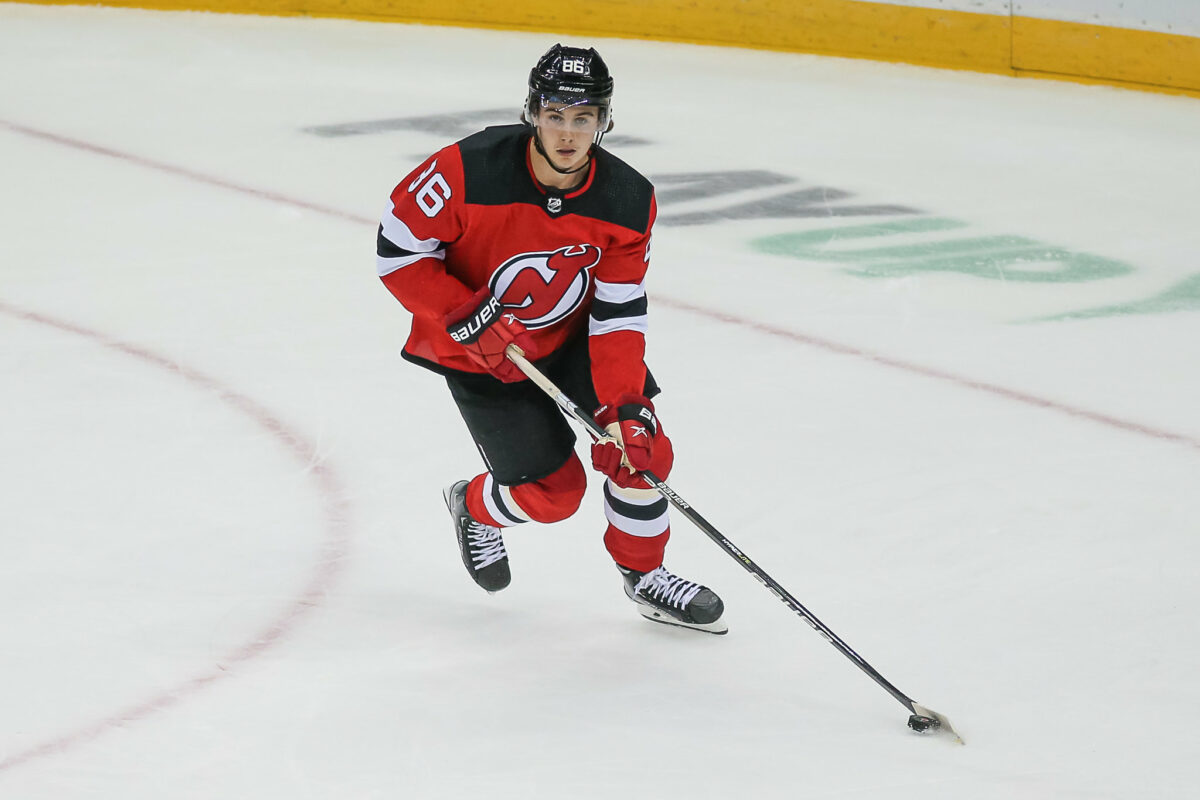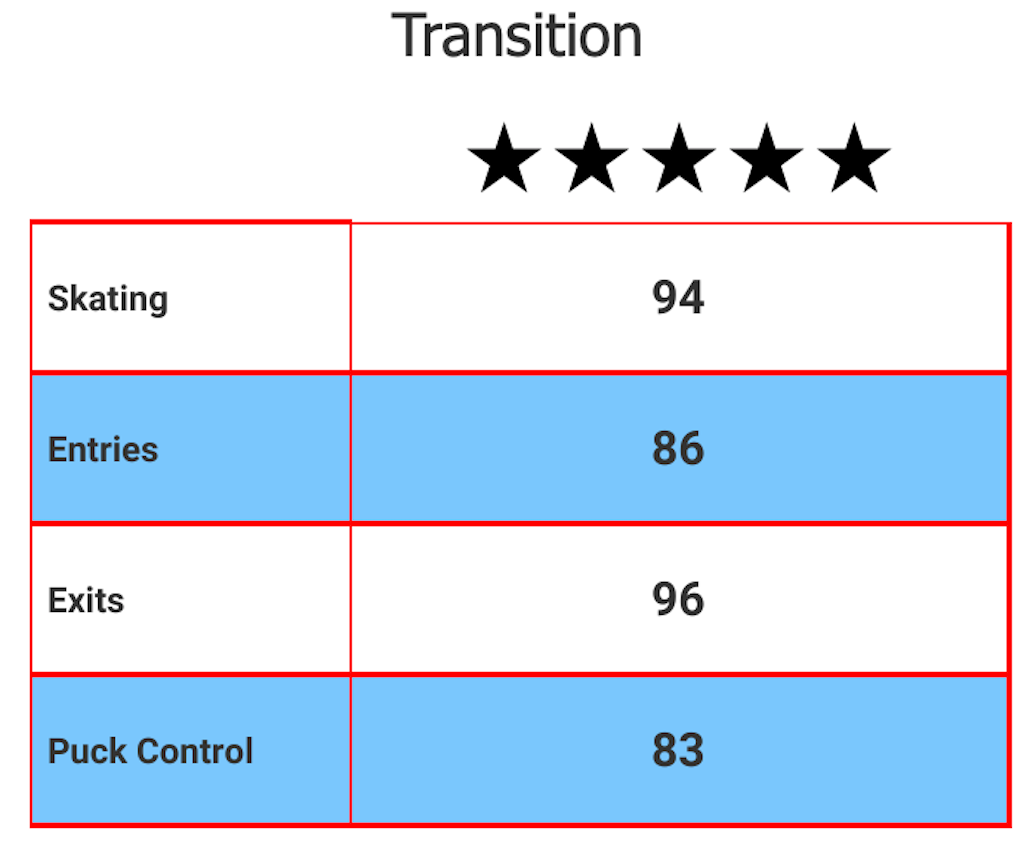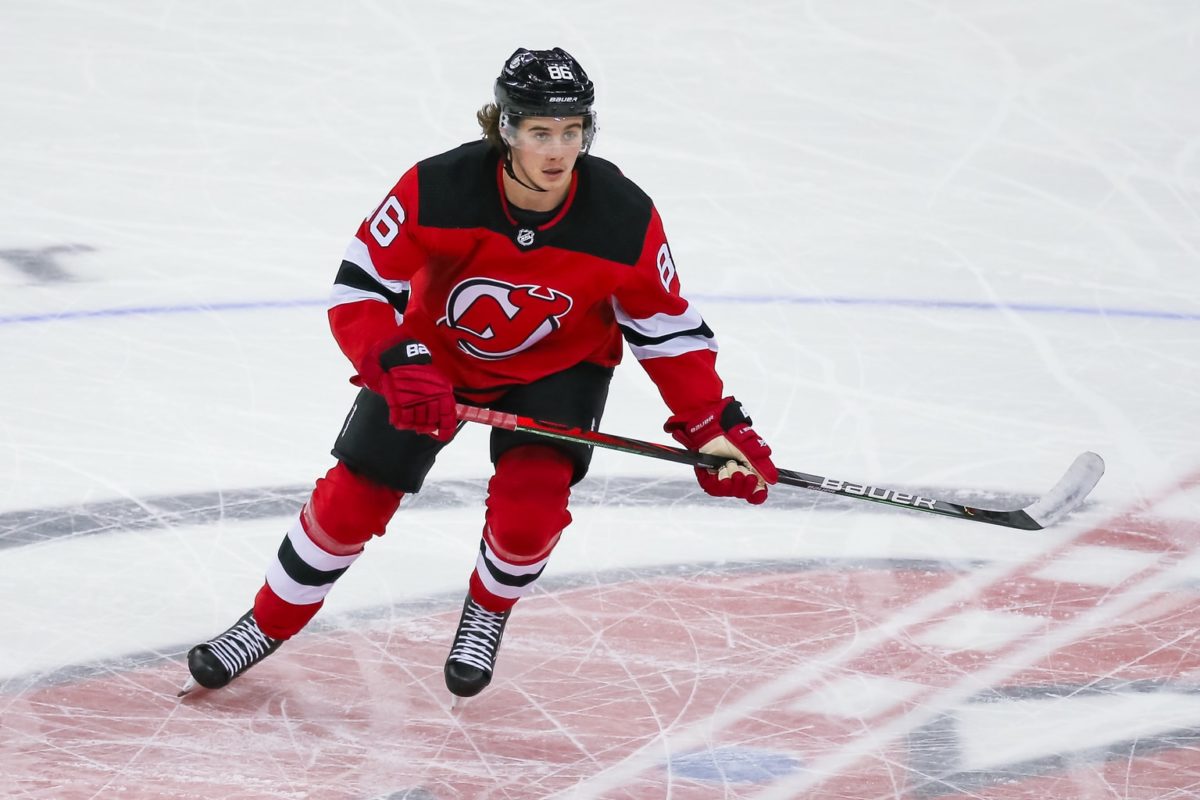Tuesday marked Jack Hughes Day in New Jersey. Well, at least figuratively speaking. Not only did he return to the Devils’ lineup after missing 17 games with a dislocated shoulder, but he also signed a whopping eight-year, $64 million contract extension. The deal kicks in next season and keeps him in New Jersey through the 2029-30 season when he’ll be 29 years old.
Entering Tuesday night’s game against the San Jose Sharks, Hughes had 55 points in 119 career games — an average of close to 38 points per 82 games. That may not seem like a player who’s worth an average annual value of $8 million a year. But the talent is more than evident, and the Devils are betting on that potential leading to a breakout sooner than later. Let’s take a look at why they’re probably smart to make that bet now rather than waiting to drag things out until the 2022 offseason.
Hughes’ Progress From Year 1 to Year 2
Since Hughes has only played in three games this season, using any 2021-22 data to make inferences about his contract is pointless. It’s not enough information to give us any look at what’s to come. Instead, we’ll look at his first two seasons in the league: 2019-20 and 2020-21.

Hughes’ rookie season in 2019-20 did not go as anticipated for most first overall picks. He finished with 21 points in 61 games — a 28-point pace over 82 games — before the COVID pandemic ended the Devils’ season in March, as they were not part of the NHL’s playoff bubble in Toronto that summer. And not only did his production lag, but so did most of his underlying metrics.
Hughes finished his rookie campaign with a goals above replacement (GAR) of -3, right on par with his expected GAR of -2.9. His actual results matched his expected results, and he struggled in possession as well. His Corsi for percentage (CF%) topped out at 45.79 percent, while his expected goals percentage (xG%) came in at 47.27 percent.
But even though Hughes’ numbers were mostly underwater, he was still excelling in certain aspects of the game that’d have you optimistic about his future. He was already one of the best forwards in the game in transition:

Per Bryce Chevalier’s ratings, a score of 81 is NHL average. So Hughes was above average to elite in transition as an 18-year-old rookie who made the jump straight from the USNTDP to the NHL. Forwards who are that good in transition usually end up being some of the NHL’s best scorers. A positive sign, to say the least.
Ahead to the 2020-21 season, and signs of progress in Hughes were quite noticeable. Though he only finished with 31 points in 56 games — a 45-point pace over 82 games — he was the Devils’ best player. He finished with a 55.1 CF% and 54.2 xG%, a significant jump from his rookie season. His GAR also shot up from -3 to 9.6, the best on the team (that was about equal to his xGAR of 10). And had it not been for a team-wide COVID outbreak that slowed everyone’s production down, his point totals would’ve likely been more indicative of his metrics.
Related: Devils Sign Jack Hughes to 8-Year Contract Extension
Hughes isn’t just an offense-first player, either. His two-way game saw dramatic improvement in 2020-21, as he led the team in five-on-five takeaways with 49. The next closest skater was Yegor Sharangovich, who had 26 takeaways. In fact, Hughes’ 49 takeaways were second in the league to only Leon Drasaitl, who had 55. That’s, in part, why Hughes’ possession numbers increased significantly; the puck was always on his stick. It took a season longer than most had hoped for, but he looked more like the player that made him the first overall pick in 2019.
Devils Get Ahead of Eventual Breakout
Hughes was the Devils’ most valuable player in 2020-21, and that’s what the Devils are betting on him being over the next eight-plus years. However, he still has another level to reach before being worth the money they paid him. Because as of now, the production doesn’t match the dollar amount.
For that reason, finding a contract comparable for Hughes is difficult. There aren’t many players with 55 points in their first 119 games that land eight-year, $64 million contracts. Dom Luszczyszyn has a few interesting comparisons based on his model, most of who are very good players, including Sebastian Aho and Brayden Point.
If Hughes becomes the next Point or Aho, then the Devils are set for many years to come. The question is, when is that going to happen? Had Hughes not missed 17 of the first 19 games of the season and had something similar to 18-19 points in 20 games, there probably wouldn’t be much discussion about giving him the contract he received.

With that said, with all the things we talked about previously, that breakout *should* happen sooner than later. Hughes is one of the best transition centers in the league. He’s an elite skater and playmaker, and he can drive play among the best forwards in the NHL. The Devils’ lineup is better than a season ago, and he’s the type of player that makes those around him better too.
Related: Rangers Continue to Be Haunted by Joe Sakic
I’d expect Hughes to start looking more like a $64-million man once he gets back up to speed after missing five weeks of games. He was electric in the team’s first two contests of 2021-22 (who doesn’t remember his game-winner in overtime against the Chicago Blackhawks in their season opener). And once head coach Lindy Ruff feels comfortable moving him off the wing and back to center where he belongs, his game should pick up again. That’s why getting ahead of the game and signing Hughes before a true breakout occurs makes sense.
Devils’ Bet Will Pay Off in Time
If Hughes produces at a point-per-game pace for the rest of the season, chances are he’d cost the Devils more than $8 million a year for the next eight years if they waited until this coming summer to re-sign him. That could be a problem since Jesper Bratt and Pavel Zacha will need contract extensions this offseason, with Bratt’s also looking like it’s going to cost a good bit of money.
That’s why the Devils are making this bet now. Hughes will likely live up to his lucrative contract extension in due time. Trying to save whatever money they can for when their Cup years may occur and it’s time to pay everyone else makes sense. His extension may be a bit risky since he’s not an $8 million per year player yet, but there’s a strong likelihood it happens. And chances are general manager Tom Fitzgerald and the organization will be happy with their decision sooner than later.
* * *
Advanced stats from Natural Stat Trick, Evolving-Hockey